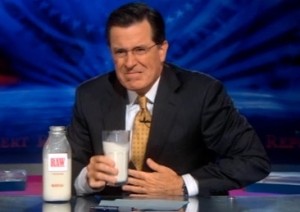The Washington Post reports that three years ago, after giving birth to her daughter, Nancy Noe had to accept the disappointing fact that she wasn’t producing enough breast milk to feed her baby.
 After trying everything—like frequent pumping and help from a lactation consultant—she did what she considered the next best thing: she went in search of the most organic baby formula she could find. “Reading the ingredients on the commercial formulas hardly made me feel any better,” Noe said recently. “I had no idea what any of this stuff was. I wanted another option.”
After trying everything—like frequent pumping and help from a lactation consultant—she did what she considered the next best thing: she went in search of the most organic baby formula she could find. “Reading the ingredients on the commercial formulas hardly made me feel any better,” Noe said recently. “I had no idea what any of this stuff was. I wanted another option.”
Then that she came across a recipe for a make-at-home formula created by the Weston A. Price Foundation (WAPF), whose stated mission is to restore nutrient-dense foods to the American diet. The formula is made using raw, or unpasteurized, cow’s milk and 13 additional ingredients—like homemade whey, lactose, gelatin, and healthy oils—designed to mimic the fat and nutrients in human breast milk.
Nancy was nervous to feed raw milk to her 7-week-old baby, and it initially didn’t go well. Her daughter experienced cheese-like vomiting, strange colored stool, and a lot of upset. “At first I thought, ‘What am I doing?’ ” Noe said. “But after two weeks, she began to thrive. She grew well, slept well, and loved her bottle. She’s now a very healthy 3-year-old.”
But the idea of a do-it-yourself formula—especially one made with raw milk— unsurprisingly has very vocal opponents.
“The idea that you would feed raw milk to an infant is completely insane,” says Katherine Lilleskov, a Brooklyn-based lactation consultant and RN. “With their weakened immune systems, infants are particularly vulnerable to harmful bacteria. It’s our job to keep our babies away from that stuff, not willingly feed it to them.
The WAPF formula was first developed nearly 20 years ago by Sally Fallon Morell, the foundation’s founding president, and nutritionist Mary Enig, early advocates for whole foods. Since then, Fallon estimates, nearly 20,000 families have used her recipe to feed their babies, and the number of parents experimenting with the formula doesn’t seem to show signs of abating. Fallon argues that the formula provides immune-stimulating, health-promoting, and antimicrobial components very similar to human breast milk, and hears often from parents happy to have found an alternative to commercial formula.
Nuts.
